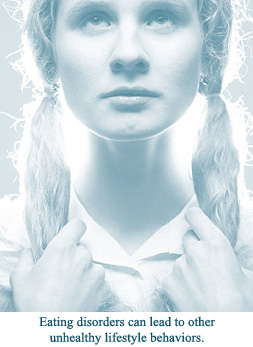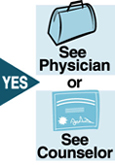Eating Disorders
Five to 10 million adolescent girls and women have an eating disorder. About 1 million males do. The 3 most common eating disorders are anorexia nervosa, bulimia nervosa, and binge eating disorder. These eating disorders are a coping mechanism. They result in an obsession with food and/or weight; anxiety around eating; guilt; and severe and adverse effects on psychological and physical health. Eating disorders should be taken very seriously.
Symptoms
For Anorexia Nervosa
For Bulimia Nervosa
|
 |
For Binge Eating Disorder
|
|
Periods of continuous and sporadic eating that are unrelated to hunger |
|
|
Impulsive binging on food without purging |
|
|
Repeated use of diets or sporadic fasts |
|
|
Weight can range from normal weight to mild, moderate, or severe obesity. |
Causes
|
No specific cause has been found for these eating disorders. They affect persons from all socio-economic classes, ages, genders, and ethnic cultures. Risk factors include:
|
 |
Treatment
|
|
Counseling. This can be in individual, family, group, and/or behavioral therapy. |
|
|
Support groups |
|
|
Antidepressant medication |
|
|
Nutrition therapy |
|
|
Outpatient treatment programs or hospitalization, if the condition is severe enough |
Questions to Ask
Do you hoard food and/or leave the table right after meals to “go to the bathroom” to induce vomiting and/or spend long periods of time in the bathroom from taking laxatives and/or water pills? |
 |
|
|
|
|
 |
|
|
|
|
 |
|
|
|
|
 |
|
|
|
|
|
Self-Help
Eating disorders are too complex and physically harmful to be treated with Self-Help alone. A professional experienced in the treatment of eating disorders should be consulted.
To Prevent an Eating Disorder
|
|
Learn to accept yourself and your body. You don’t need to be or look like anyone else. Spend time with people who accept you as you are, not people who focus on “thinness.” |
|
|
Understand that your self esteem does not have to be dependent on your body weight. |
|
|
Eat nutritious foods. Focus on complex carbohydrates (whole grains, beans, etc.), fresh fruits and vegetables, low-fat dairy foods and low-fat meats. |
|
|
Commit yourself to the goal of normalized eating but realize that it will take time. It will also take courage to fight your fears of becoming fat or gaining too much weight. |
|
|
Eat at regular times during the day. Don’t skip meals. If you do, you are more likely to binge when you eat. |
|
|
Avoid white flour, sugar and “junk” foods high in calories, such as cakes, cookies or pastry, which have fat and sugar. Bulimics tend to binge on junk food. The more they eat, the more they want. |
|
|
Get regular moderate exercise 3 to 4 times a week. If you exercise more than your health care provider advises, make an effort to do non-exercise activities with friends and family. |
|
|
Find success in things that you do. Your work, school, hobbies and volunteer activities will promote self-esteem. |
|
|
Learn as much as you can about eating disorders from books and organizations that deal with them. |
|
|
Parents who want to help their
children avoid eating disorders should promote a balance between
their childs’ competing needs for both independence and family
involvement. |
If You Have an Eating Disorder
|
 |
What You Can Do for a Friend or Relative
|
|
Learn as much about the disorder as you can. Eating disorders are complicated matters that are not easily understood by someone who has never had the problem or been in contact with someone who has. |
|
|
Be supportive, not controlling. Avoid power struggles. The last thing an eating disorder sufferer needs is added “outside control.” Part of their eating disorder stems from feeling that others are in control of their lives. Eating (or not eating) is the only way they can gain some control. Offer your help by letting the person know you’re there if they want your help. |
|
|
Try to get your friend or relative to see that there is a problem and to seek professional help. These disorders are too complicated for self-help programs. You can, however, help your friend or relative learn more about their specific problem through books and articles related to the subject. Reassure your friend or relative that they will not be “judged” in treatment, but that they will be understood and helped. |
|
|
Don’t ignore or deny the problem. Often, the closest friends and/or family members are the last to accept that their child or friend has an eating disorder. |
|
|
Seek professional help yourself. If you feel the need to talk about your friend or relative’s problems with someone, contact a support group and/or mental health professional who deals with eating disorders. (See “National Resources”.) |
